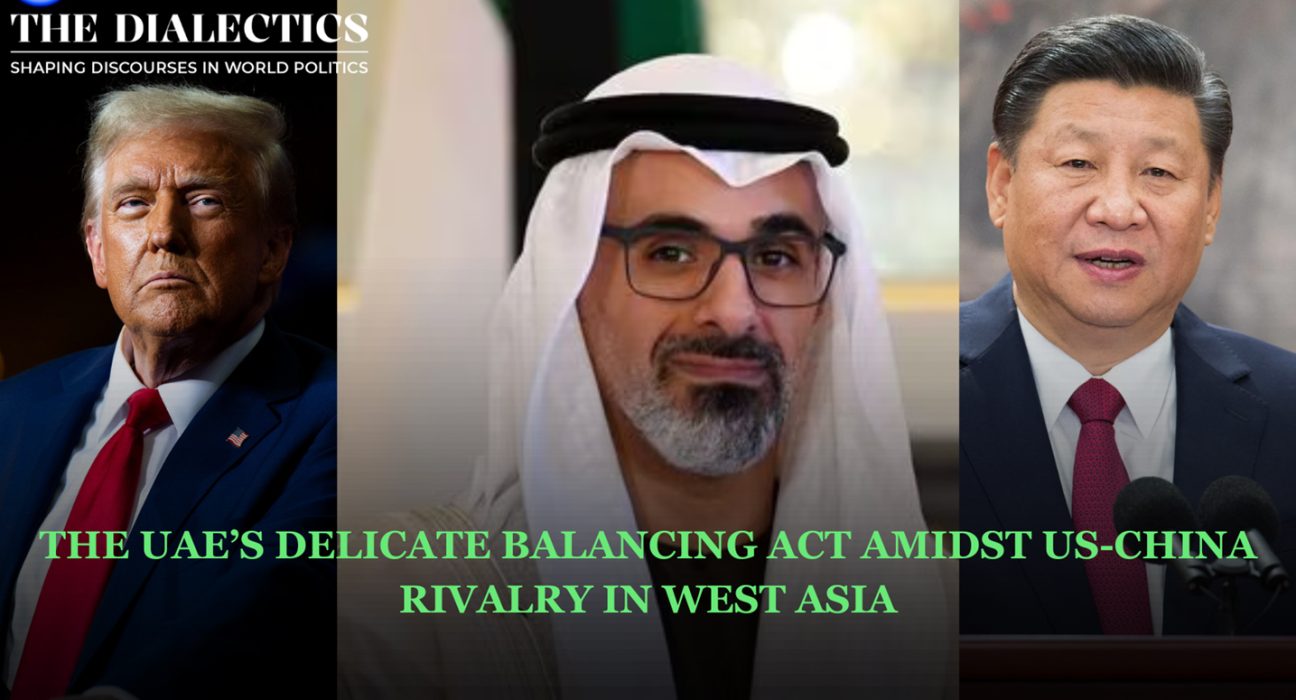Due to its geopolitical significance, the Middle East has become a primary focus region for the US and China. The region is strategically located due to its vast energy and oil resources. China and the USA seek to expand their geopolitical influence by fostering relations with key countries like the UAE (United Arab Nations) and Saudi Arabia. The US maintains a longstanding military presence in the region, whereas China serves more as an economic model. For the Gulf countries, the strategy is to manage the differences between the two countries rather than choosing one over the other. This ‘balancing act’ is evident across various domains – economic and trade relations, multilateral cooperation, and military exercises. In the last decade, after years of following a foreign policy that is more aligned with its neighbouring GCC countries, the UAE has been trying to maintain relations amid intense competition between the US and China. More recently, the UAE has been focused on pursuing an independent foreign policy apart from the USA, thus its more active relationship with China. The latter has become a significant economic partner for the UAE – bilateral trade between the two countries is said to have reached $74.5 billion in the first nine months of 2024. The country is also an active participant in China’s Belt and Road Initiative (BRI), through which it seeks to expand its global influence. The UAE has contributed approximately $10 billion to support BRI projects. At the same time, China has signed 13 Memorandum of Understanding (MoUs) to invest in various sectors in the UAE, further strengthening their strategic economic ties. Another driving factor for the countries’ deepening economic ties is the latter’s remarkable technological development – Chinese companies like Huawei have been active in deploying 5G networks and other technological infrastructure in the Middle East. The UAE’s adoption of this technology has been a point of contention in its relations with the US, which has opposed the use of the Huawei 5G technology, but the country has pressed on despite pressure from the US. However, despite such instances, the UAE remains one of the US’ closest regional allies in the MENA (Middle East and North Africa) region, with the US being the UAE’s most vital security partner, which it cannot replace anytime soon.
Relations with China – beyond Economic ties
The Gulf country hosts multiple military centres of the USA. More recently, with the normalisation of relations with Israel in 2020 via the Abraham Accords, it remains in the good books of the West. However, the UAE considers China a critical part of its economy, and its relations with China are also a result of wanting to counter and reduce its dependency on neighbouring countries and the USA. Given that China-UAE relations have the potential to become more political, it would not be a surprise if China’s influence grows more than that of the USA in the region. But so far, the UAE has not engaged in any military or security deals with China, which is fatal in maintaining its balance amidst the Cold War between the US and China. It is significant to note that after moving towards closer relations with China, there have been more areas of contention and strains in the UAE’s relationship with the USA. One of the major developments in UAE-US relations was due to the former’s reliance on the Huawei 5G technology.
The US under the Biden-led administration was much more critical of UAE’s growing relations with China, so the F-35 jets, part of a deal made to purchase advanced military equipment from the USA, were put on hold. This is one of the major decisions that the GCC country has had to make in recent years. So far, it seems clear that as long as the UAE’s relations with China remain strictly economic, it won’t have trouble navigating itself amidst the intense geopolitical rivalry between the two greater powers. But is this the case? The two countries now have a comprehensive strategic partnership, indicating that their relations could grow in more dimensions – political and military, specifically. In 2023, the two countries conducted their first military exercise, a joint air force exercise, “Falcon Shield 2023”, in China’s Xinjiang Uyghur region. Political ties have also begun to cement in the last decade – UAE seeks to contain Iran’s influence in the region. It relies on China to mediate any territorial disputes with the country. China had also supported the UAE’s claims over the disputed islands of Abu Musa, Greater Tunb and Lesser Tunb, thus backing the UAE politically for its territorial assertions. In turn, UAE also recognises the ‘One China Policy’ and denies any existence of Taiwan. Thus, from the UAE’s perspective, it is much easier to align with China as the country places relatively less political considerations than the USA. Still, relations are only expected to grow stronger shortly. It is also possible that the UAE might seek military aid from China, given developments in the past year – the Biden administration had quietly blocked arms sales to the UAE and stated the reason as allegedly being involved in Sudan’s ongoing civil war. So far, there has been no news of arms sales being resumed under the Trump administration.
While relations with China continue to grow by a large margin, it is unlikely that the UAE will jeopardise relations with the USA completely to better relations with its rival. Thus, the most likely scenario is that the Gulf country will continue to walk a thin line between the US and China, moving towards what benefits it the most – China as an economic partner and the USA as a security partner, until it manages to find an alternative to the military hardware that it requires, which China does not seem to possess so far. Thus, the UAE’s geopolitical strategy reflects a pragmatic approach that maximises its national interests.






